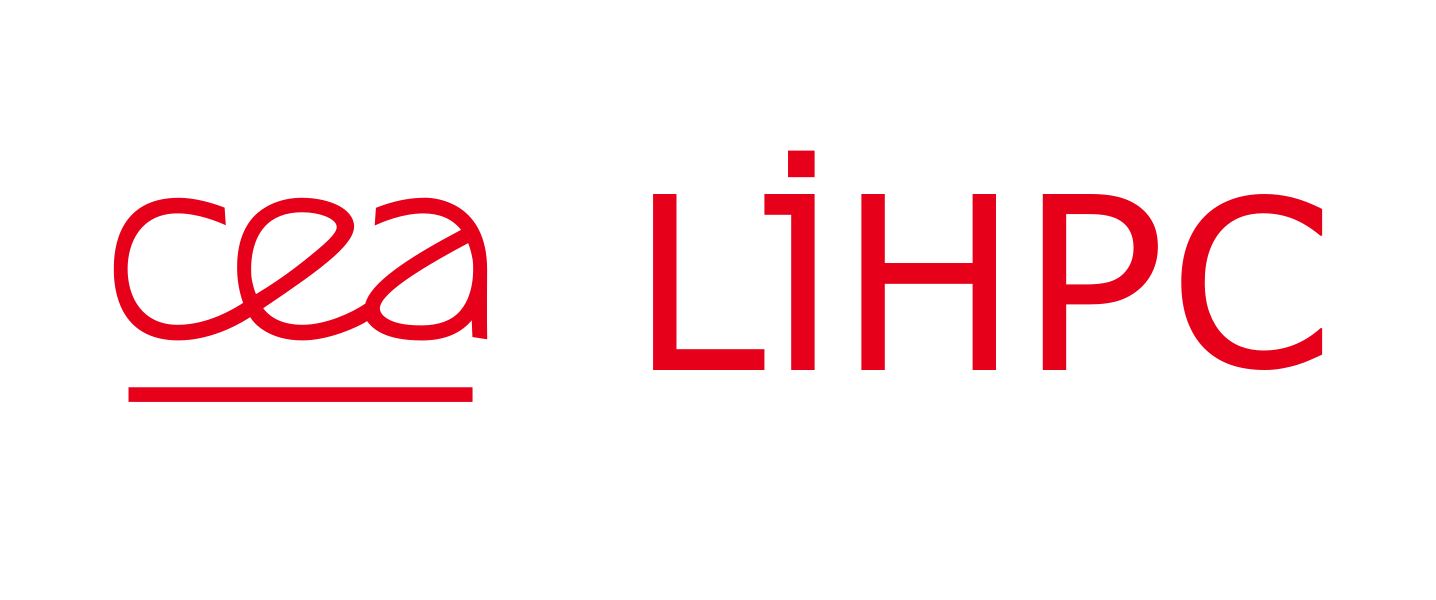Marc Pérache is an engineer and researcher in computer science, a CEA research director, a CEA Fellow and a holder of an “Habilitation à Diriger des Recherches” (French degree which accredits to supervise researches) in computer science. He is in charge of coordinating the adaptation of software and programming models to current and future supercomputers.
Its main research theme concerns runtime systems and parallel programming models, in particular MPI in a multithreaded context. This work targets massively parallel architectures such as the TOP 500 supercomputers.
Marc Pérache has supervised 10 theses (+ 3 in progress) and is co-author of more than 30 articles in conferences and journals.
European MPI Users' Group Meeting, 2024

abstract
Abstract
The evolution of parallel computing architectures presents new challenges for developing efficient parallelized codes. The emergence of heterogeneous systems has given rise to multiple programming models, each requiring careful adaptation to maximize performance. In this context, we propose reevaluating memory layout designs for computational tasks within larger nodes by comparing various architectures. To gain insight into the performance discrepancies between shared memory and shared-address space settings, we systematically measure the bandwidth between cores and sockets using different methodologies. Our findings reveal significant differences in performance, suggesting that MPI running inside UNIX processes may not fully utilize its intranode bandwidth potential. In light of our work in the MPC thread-based MPI runtime, which can leverage shared memory to achieve higher performance due to its optimized layout, we advocate for enabling the use of shared memory within the MPI standard.
Microprocessors and Microsystems, Volume 110, October 2024, 105102, 2024

abstract
Abstract
RED-SEA is a H2020 EuroHPC project, whose main objective is to prepare a new-generation European Interconnect, capable of powering the EU Exascale systems to come, through an economically viable and technologically efficient interconnect, leveraging European interconnect technology (BXI) associated with standard and mature technology (Ethernet), previous EU-funded initiatives, as well as open standards and compatible APIs. To achieve this objective, the RED-SEA project is being carried out around four key pillars: (i) network architecture and workload requirements-interconnects co-design – aiming at optimizing the fit with the other EuroHPC projects and with the EPI processors; (ii) development of a high-performance, low-latency, seamless bridge with Ethernet; (iii) efficient network resource management, including congestion and Quality-of-Service; and (iv) end-to-end functions implemented at the network edges. This paper presents key achievements and results at the midterm of the project for each key pillar in the way to reach the final project objective. In this regard we can highlight: (i) The definition of the network requirements and architecture as well as a list of benchmarks and applications; (ii) In addition to initially planned IPs progress, BXI3 architecture has evolved to support natively Ethernet at low level, resulting in reduced complexity, with advantages in terms of cost optimization, and power consumption; (iii) The congestion characterization of target applications and proposals to reduce this congestion by the optimization of collective communication primitives, injection throttling and adaptive routing; and (iv) the low-latency high-message rate endpoint functions and their connection with new open technologies.
Abstract
High-Performance Computing (HPC) is currently facing significant challenges. The hardware pressure has become increasingly difficult to manage due to the lack of parallel abstractions in applications. As a result, parallel programs must undergo drastic evolution to effectively exploit underlying hardware parallelism. Failure to do so results in inefficient code. In this pressing environment, parallel runtimes play a critical role, and their esting becomes crucial. This paper focuses on the MPI interface and leverages the MPI binding tools to develop a multi-language test-suite for MPI. By doing so and building on previous work from the Forum’s document editors, we implement a systematic testing of MPI symbols in the context of the Parallel Computing Validation System (PCVS), which is an HPC validation platform dedicated to running and managing test-suites at scale. We first describe PCVS, then outline the process of generating the MPI API test suite, and finally, run these tests at scale. All data sets, code generators, and implementations are made available in open-source to the community. We also set up a dedicated website showcasing the results, which self-updates thanks to the Spack package manager.
Abstract
MPI is the most widely used interface for high-performance computing (HPC) workloads. Its success lies in its embrace of libraries and ability to evolve while maintaining backward compatibility for older codes, enabling them to run on new architectures for many years. In this paper, we propose a new level of MPI compatibility: a standard Application Binary Interface (ABI). We review the history of MPI implementation ABIs, identify the constraints from the MPI standard and ISO C, and summarize recent efforts to develop a standard ABI for MPI. We provide the current proposal from the MPI Forum’s ABI working group, which has been prototyped both within MPICH and as an independent abstraction layer called Mukautuva. We also list several use cases that would benefit from the definition of an ABI while outlining the remaining constraints.
Proceedings of SBAC-PAD 2022, IEEE, 2022


abstract
Abstract
HPC systems have experienced significant growth over the past years, with modern machines having hundreds of thousands of nodes. Message Passing Interface (MPI) is the de facto standard for distributed computing on these architectures. On the MPI critical path, the message-matching process is one of the most time-consuming operations. In this process, searching for a specific request in a message queue represents a significant part of the communication latency. So far, no miracle algorithm performs well in all cases. This paper explores potential matching specializations thanks to hints introduced in the latest MPI 4.0 standard. We propose a hash-table-based algorithm that performs constant time message-matching for no wildcard requests. This approach is suitable for intensive point-to-point communication phases in many applications (more than 50% of CORAL benchmarks). We demonstrate that our approach can improve the overall execution time of real HPC applications by up to 25%. Also, we analyze the limitations of our method and propose a strategy for identifying the most suitable algorithm for a given application. Indeed, we apply machine learning techniques for classifying applications depending on their message pattern characteristics.
Zenodo, 2022


abstract
Abstract
This document feeds research and development priorities devel-oped by the European HPC ecosystem into EuroHPC’s Research and Innovation Advisory Group with an aim to define the HPC Technology research Work Programme and the calls for proposals included in it and to be launched from 2023 to 2026. This SRA also describes the major trends in the deployment of HPC and HPDA methods and systems, driven by economic and societal needs in Europe, taking into account the changes ex-pected in the technologies and architectures of the expanding underlying IT infrastructure. The goal is to draw a complete pic-ture of the state of the art and the challenges for the next three to four years rather than to focus on specific technologies, implementations or solutions.
Tools for High Performance Computing 2018 / 2019, Springer International Publishing, p. 151-168, 2021

abstract
Abstract
The backtrace is one of the most common operations done by profiling and debugging tools. It consists in determining the nesting of functions leading to the current execution state. Frameworks and standard libraries provide facilities enabling this operation, however, it generally incurs both computational and memory costs. Indeed, walking the stack up and then possibly resolving functions pointers (to function names) before storing them can lead to non-negligible costs. In this paper, we propose to explore a means of extracting optimized backtraces with an O(1) storage size by defining the notion of stack tags. We define a new data-structure that we called a hashed-trie used to encode stack traces at runtime through chained hashing. Our process called stack-tagging is implemented in a GCC plugin, enabling its use of C and C++ application. A library enabling the decoding of stack locators though both static and brute-force analysis is also presented. This work introduces a new manner of capturing execution state which greatly simplifies both extraction and storage which are important issues in parallel profiling.
Abstract
Heterogeneous supercomputers are now considered the most valuable solution to reach the Exascale. Nowadays, we can frequently observe that compute nodes are composed of more than one GPU accelerator. Programming such architectures efficiently is challenging. MPI is the defacto standard for distributed computing. CUDAaware libraries were introduced to ease GPU inter-nodes communications. However, they induce some overhead that can degrade overall performances. MPI 4.0 Specification draft introduces the MPI Sessions model which offers the ability to initialize specific resources for a specific component of the application. In this paper, we present a way to reduce the overhead induced by CUDA-aware libraries with a solution inspired by MPI Sessions. In this way, we minimize the overhead induced by GPUs in an MPI context and allow to improve CPU + GPU programs efficiency. We evaluate our approach on various micro-benchmarks and some proxy applications like Lulesh, MiniFE, Quicksilver, and Cloverleaf. We demonstrate how this approach can provide up to a 7x speedup compared to the standard MPI model.
Tools for High Performance Computing 2017, Springer International Publishing, p. 57-71, 2019

abstract
Abstract
Several instrumentation interfaces have been developed for parallel programs to make observable actions that take place during execution and to make accessible information about the program’s behavior and performance. Following in the footsteps of the successful profiling interface for MPI (PMPI), new rich interfaces to expose internal operation of MPI (MPI-T) and OpenMP (OMPT) runtimes are now in the standards. Taking advantage of these interfaces requires tools to selectively collect events from multiples interfaces by various techniques: function interposition (PMPI), value read (MPI-T), and callbacks (OMPT). In this paper, we present the unified instrumentation pipeline proposed by the MALP infrastructure that can be used to forward a variety of fine-grained events from multiple interfaces online to multi-threaded analysis processes implemented orthogonally with plugins. In essence, our contribution complements “front-end” instrumentation mechanisms by a generic “back-end” event consumption interface that allows “consumer” callbacks to generate performance measurements in various formats for analysis and transport. With such support, online and post-mortem cases become similar from an analysis point of view, making it possible to build more unified and consistent analysis frameworks. The paper describes the approach and demonstrates its benefits with several use cases.
OpenMP: Conquering the Full Hardware Spectrum - 15th International Workshop on OpenMP, IWOMP 2019, Auckland, New Zealand, September 11-13, 2019, Proceedings, Springer, p. 231-245, 2019

abstract
Abstract
The advent of the multicore era led to the duplication of functional units through an increasing number of cores. To exploit those processors, a shared-memory parallel programming model is one possible direction. Thus, OpenMP is a good candidate to enable different paradigms: data parallelism (including loop-based directives) and control parallelism, through the notion of tasks with dependencies. But this is the programmer responsibility to ensure that data dependencies are complete such as no data races may happen. It might be complex to guarantee that no issue will occur and that all dependencies have been correctly expressed in the context of nested tasks. This paper proposes an algorithm to detect the data dependencies that might be missing on the OpenMP task clauses between tasks that have been generated by different parents. This approach is implemented inside a tool relying on the OMPT interface.
Euro-Par 2013: Parallel Processing Workshops - BigDataCloud, DIHC, FedICI, HeteroPar, HiBB, LSDVE, MHPC, OMHI, PADABS, PROPER, Resilience, ROME, and UCHPC 2013, Aachen, Germany, August 26-27, 2013. Revised Selected Papers, Springer, p. 168-177, 2013

Chapman; Hall/CRC, 2013

abstract
Abstract
Contemporary High Performance Computing: From Petascale toward Exascale focuses on the ecosystems surrounding the world’s leading centers for high performance computing (HPC). It covers many of the important factors involved in each ecosystem: computer architectures, software, applications, facilities, and sponsors. The first part of the book examines significant trends in HPC systems, including computer architectures, applications, performance, and software. It discusses the growth from terascale to petascale computing and the influence of the TOP500 and Green500 lists. The second part of the book provides a comprehensive overview of 18 HPC ecosystems from around the world. Each chapter in this section describes programmatic motivation for HPC and their important applications; a flagship HPC system overview covering computer architecture, system software, programming systems, storage, visualization, and analytics support; and an overview of their data center/facility. The last part of the book addresses the role of clouds and grids in HPC, including chapters on the Magellan, FutureGrid, and LLGrid projects. With contributions from top researchers directly involved in designing, deploying, and using these supercomputing systems, this book captures a global picture of the state of the art in HPC.
Euro-Par 2008 Workshops - Parallel Processing, VHPC 2008, UNICORE 2008, HPPC 2008, SGS 2008, PROPER 2008, ROIA 2008, and DPA 2008, Las Palmas de Gran Canaria, Spain, August 25-26, 2008, Revised Selected Papers, Springer, p. 53-62, 2008









